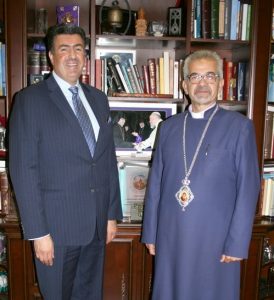(Rome) A few days ago an article appeared in which the attempt was made to rehabilitate the French Jesuit Teilhard de Chardin. The damning verdict of the CDF against the theologian is being played down there and dismissed as "controversial". The article did not appear in just any old daily newspaper, but in the Osservatore Romano. What does this have to do with the question of obedience? Does it follow from this article and its theories are to be even represented in the daily paper of the Vatican?
St. Thomas Aquinas drew a clear line between obedience and disobedience. Rightful obedience as a virtue he defined in the Summa Theologiae (II-II, q. 104-195), but he gives two reasons why one who is obligated to obey his superior might owe him no obedience.
The first reason is a statement by an even higher authority. In respect to this, the saint refers to Peter Lombard: When the Emperor commands something, but God the contrary, one must obey God, without regard to the Emperor.
The second reason is, if the supervisor commands something of his subordinate in areas where he may hold him subject. Thomas Aquinas concludes that the people in the inner motives of the will owe obedience to God alone.
The forces that Rouse the New Pontificate
Osservatore Romano published a long essay in its issue of 29 December 2013.
"I study the matter and find the spirit" of Maurizio Gronchi, who attempts the rehabilitation of the thinking of Pierre Teilhard de Chardin, and thus seeks to annul the
monitem by the CDF against the French Jesuits of 30 June 1962. Basically, there is no obligationof a daily newspaper to "obey" in its position, not even a Catholic newspaper. But with
Osservatore Romano , things are a bit different because it is not just any daily newspaper. Based on the instructions of Blessed Pius IX., this is the only daily newspaper that is printed in the Vatican City State.
The chief editor is appointed directly by the Pope. Although the newspaper is not an official organ of the Holy See, but at least semi-official. It comes logically that the opinion expressed is that of the Holy See. Of course, the editors have more room for maneuver in the fields of culture, politics and economy. However, this freedom would be a seduction into error if on the pages of L'Osservatore Romano article were published things that contradict the faith of the Church, the Magisterium of the Church and tradition.
Rehabilitation Attempt of Teilhard de Chardin Against the Official Condemnation
In this specific case, it is not just about a purely hypothetical consideration. The article with the rehabilitation of Teilhard de Chardin also has its positive side: it provides the occasion to highlight the limits of obedience. Should anyone think that maybe in the desire for faithful obedience of Pope Francis and the Osservatore Romano, there is need to follow the thesis of the author, then he should also know that he is in this against the 1962 monitum pronounced by Blessed John XXIII. An official admonition that continues to have full force and effect.
The thing is so obvious that the journalist admits it openly and reproduces the admonition of the CDF, but referred to it as "controversial and painful." But anyone who follows such a judgment, speaks of not just any opinion but opposes in reality the papal Magisterium. The Monitus reads: "Certain works of Father Pierre Teilhard de Chardin, including some posthumous, are published and can not find the least benevolence. [...] In the philosophical and theological point of view it clearly recognizes that the said works contain dangerous ambiguities and serious errors which offend Catholic doctrine."
"Author on the Road to Apostasy"
Maurizio Gronchi doesn't even like the Magisterium of the Church, who praises Teilhard de Chardin to the skies, while "even leading the reader to error" ( Corrispondenza Romana ) by citing incomplete judgments against Jesuit or torn out of context . According to the author's thought, the Frenchman was not heretical, but had, at best, "some weaknesses and difficulties." The "dangerous ambiguities and serious errors" is an issue for Gronchi. In an article in the Osservatore Romano, a document of the Magisterium of the Church, adopted by the Congregation of the Faith, with the approval of the Pope, is referred to as "controversial and painful." "This means that the author is treading the path of apostasy already," says Corrispondenza Romana . In addition to that there is still the effusive praise for what has been explicitly condemned by the Magisterium.
The author thus lays claim to a wish to correct the Magisterium of the Church, and does so from the sides of the semi-official newspaper of the Vatican. Teihard de Chardin, who denies original sin and the distinction between matter and spirit represents, so says Gronchi, no "serious errors", but only tolerable "weaknesses and difficulties."
How Did the Article Appear in the Osservatore Romano ?
The backgrounds are unclear how it was possible that Gronchi could place his article in L'Osservatore Romano. The fact is that he is an example of where obedience is obligated to "disobedience": Whoever wants to be faithful to the Magisterium of the Church, must reject the published thesis of 29 December by Gronchi in the Osservatore Romano.
Maurizio Gronchi is a priest of the diocese of Pisa, Professor of Christology at the Theological Faculty of the Pontifical Urban University in Rome and Consultor the CDF .
Text: CR / Giuseppe Nardi
image: L'Osservatore Romano (Screenshot mounting)
Trans: Tancred vekron99@hotmail.com
Link to Katholisches...





